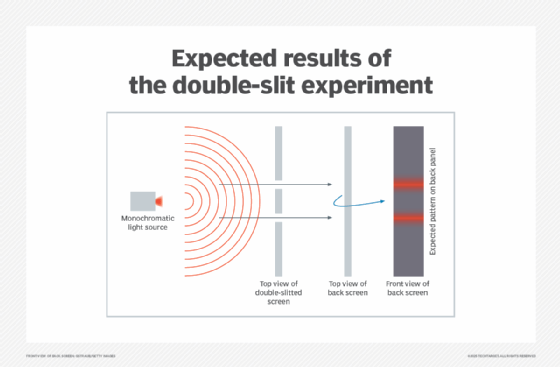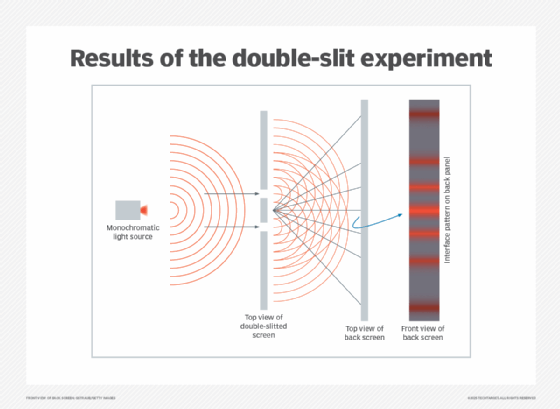What is quantum superposition?
Quantum superposition is the ability of a quantum system to act as if it is in multiple states at the same time until it is measured.
Superposition is a property of all wave functions. Quantum mechanics uses probability waves to represent the states of particles. When quantum particles are acting according to probability waves, they are said to be in a state of quantum superposition.
Superposition can apply to any state that a quantum system might be in. This includes location, electron spin or energy level.
Quantum superposition and the double-slit experiment
Quantum superposition can be shown by the double-slit experiment. It was first used to prove that light consists of waves. Today, the experiment is used to help people understand the way that electrons can act like waves and create quantum interference patterns.
For this experiment, a beam of coherent light, such as a laser, is aimed at a barrier with two vertical slits. The light passes through the slits, and the resulting pattern is recorded on a photographic plate. When one slit is covered, the pattern is what would be expected: a single line of light, aligned with whichever slit is open.
Intuitively, one would expect that if both slits are open, the pattern of light will reflect two lines of light aligned with the slits. In fact, what happens is that the photographic plate separates into multiple lines of lightness and darkness in varying degrees.

This shows that the light is acting as waves, and the two waves are interfering with each other, adding together in some places to become brighter and canceling out in other places to become darker. The same pattern is shown if photons or electrons are used.
Where this becomes surprising is if the experiment is repeated so that only single photons or electrons are sent through the two slits, one at a time. The same interference pattern is shown, even though only one particle is present. It is almost as if the one particle goes through both slits at the same time and interferes with itself. In order to do this, it must be in a superposition state.

Interestingly, if a detector is added to determine which slit the particle goes through, the probability wave collapses, and the interference pattern disappears. The loss of the superposition is known as quantum decoherence.
Superposition and Schrödinger's cat
The Schrödinger's cat thought experiment was first used to point out the seeming absurdity of superposition. But it is now used as another way to illustrate the phenomena.
In the thought experiment, a cat is placed in a sealed box with a vial of poison that will kill the cat if some random event happens, such as on the decay of a radioactive atom. From outside the sealed box, whether the cat is alive or dead is unknowable, so the cat is in a state of superposition and is both alive and dead at the same time. It is not until the box is unsealed that the state of the cat can be known.

Large molecules made up of thousands of atoms have been shown to exhibit superposition states by researchers. This opens up the possibility of even macroscopic systems having quantum behavior.
It is important to state, though, that quantum mechanics, as it is used today, is primarily a mathematical model and doesn't make claims as to what is going on. Instead, it makes predictions based on probability that have been shown to be true.
Simple statements such as that "the electron went through both slits" or "the cat is both alive and dead" are not technically correct. It is more accurate to say that "the electron has no position while it is traveling" or "the cat is neither alive nor dead to the outside observer."
Superposition in quantum computing
In computing, the concept of superposition has important implications for the way information could be processed and stored in the future. For example, today's classical computers process information in bits of 1 or 0, similar to a light switch being turned on or off. Quantum computers, however, will process information as qubits -- 1, 0 or a superposition of the two states.
Quantum computers can theoretically perform any operation that a classical computer can. But in addition to classical operation, the qubits can use quantum states such as interference, entanglement and superposition to do things that classical computers cannot. For example, a Hadamard gate can put a qubit into a superposition state so that its state is not determined until the calculation is finished.
Like any emerging technology, quantum computing offers opportunities and risks. Learn how quantum computing compares with classical computing and explore quantum key distribution for exchanging encryption keys. Explore five quick quantum computing terms.
